

Matt Walker: How caffeine and alcohol affect your sleep. Matt Walker: A walk through the stages of sleep. Matt Walker: Why sleep matters now more than ever. Sleep is your superpower [ TED Talk : Matt Walker ] Why ‘Sleep on It’ Is Our Most Useful Advice for Learning. A s a strategy for raising educational achievement, sleep should rank highly.
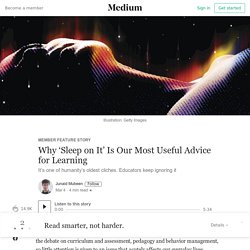
Yet you will hear scant mention of sleep in the education discourse. For all the debate on curriculum and assessment, pedagogy and behavior management, so little attention is given to an issue that acutely affects our everyday lives. Matthew Walker’s Why We Sleep addresses that dearth. Sleep, it appears, is vital to every aspect of our mental and physical wellbeing. Walker’s expertise lies in neuroscience, and his well researched work exposes the fallacy in thinking we can get by with compromising on our sleep — not just the amount of sleep we get, but also the consistency of our sleep patterns. Sleep, Walker suggests, is crucial to problem solving. Walker is only confirming what problem solvers have long understood. French polymath Henri Poincare articulated the importance of sleep in the nature of invention, stating, “The role of this unconscious work in mathematical invention appears to me incontestable.”
The Miracle and Mystery of Sleep: 12 Remarkable Psychological Studies. “Sleeping is no mean art: for its sake one must stay awake all day.”

~Friedrich Nietzsche What beautiful rewards sleep delivers– if you can get enough of it. Sleep has profound effects on our memories, desires, self-control, learning, relationships and more. Here are twelve studies which demonstrate some of the psychological benefits of sleep and a few of the dangers of not getting enough. Does Too Much Sleep Have Negative Repercussions? Source: wavebreakmedia/Shutterstock Common sense and anecdotal evidence support the notion of consistently getting a good night’s sleep throughout the week.
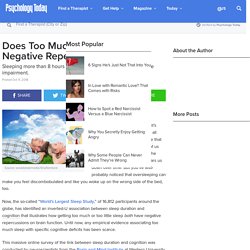
We all know from first-hand experience that sleeping too little makes most of us groggy and prone to brain fog the following day. Lack of sleep wears us down over time. But you've also probably noticed that oversleeping can make you feel discombobulated and like you woke up on the wrong side of the bed, too. article continues after advertisement Now, the so-called “World’s Largest Sleep Study,” of 16,812 participants around the globe, has identified an inverted-U association between sleep duration and cognition that illustrates how getting too much or too little sleep both have negative repercussions on brain function.
This massive online survey of the link between sleep duration and cognition was conducted by neuroscientists from the Brain and Mind Institute at Western University in Ontario, Canada. Source: Conor J. How Much Sleep Do You Actually Need? Sleep or Die [ RSA Minimate : Matthew Walker ]
Chronobiology. Sleep Deprivation. Fatigue. Memory. How to Fall Asleep in 120 Seconds. When you’re on military exercise, sleep is a luxury.

Maybe you can only snatch a few hours each day. So there’s nothing so frustrating as lying in your sleeping bag with your eyes closed, waiting for something to happen. You’re totally exhausted. You have to be up in three hours for picket. You’re distracted by the noises around you. If you don’t sleep, you’ll burn out pretty quickly. That’s what happened with U.S. fighter pilots in World War II. No one wants to be that guy. Luckily, you never have to be. Which means if you follow these steps, falling asleep will be a piece of cake.
Work with the real estate you have Check out the available terrain. In the training, the pilots were taught to fall asleep while sitting upright in a chair. Your face is the key to slowing down everything Now that you’ve got your position, it’s all about the face. Your eyes are shut, but you want to make sure they are totally limp. Send your upper body south Now it’s all about the shoulders. Relax Like A Pro: 5 Steps to Hacking Your Sleep. I once went almost five days without sleep in 1996 just to see 1) if I could make a week (I couldn’t), and 2) what the side-effects would be.

I was a new neuroscience major at Princeton at the time and hoped to do research with famed serotonin pioneer, Barry Jacobs. Hallucinations cut my sleep deprivation trial short, but I’ve continued to experiment with sleep optimization and variation as a means of improving performance. Here are a few effective techniques and hacks I’ve picked up over the last five years from sources ranging from biochemistry PhDs to biologists at Stanford University…
Get Better Sleep: 5 Powerful New Tips From Research. Ever have trouble getting to sleep?
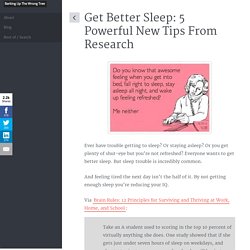
Or staying asleep? The Most Successful Techniques for Rising Early. ‘The proper response to life is applause.’
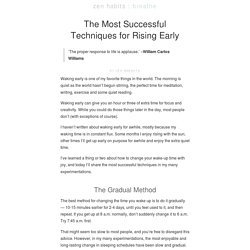
~William Carlos Williams By Leo Babauta Waking early is one of my favorite things in the world. The morning is quiet as the world hasn’t begun stirring, the perfect time for meditation, writing, exercise and some quiet reading. Waking early can give you an hour or three of extra time for focus and creativity. I haven’t written about waking early for awhile, mostly because my waking time is in constant flux. I’ve learned a thing or two about how to change your wake-up time with joy, and today I’ll share the most successful techniques in my many experimentations. The Gradual Method. The Incredible Importance of Sleep for Habits & Motivation. By Leo Babauta.
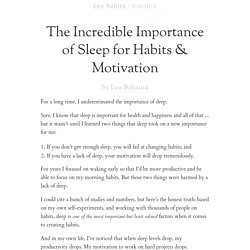
Physiological Needs. Immune System. Sleep.